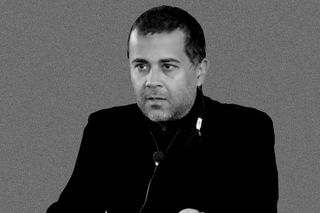
Chetan Bhagat’s Botched Flirtation Forces Us to Reckon With the Gray Areas of #MeToo
Pursuit used to epitomize masculinity. No longer.

The past three days have been a whirlwind for Indian feminists, who had been waiting with bated breath to see the #MeToo movement take hold on these shores. Last week, after the dismissive reactions to Tanushree Dutta’s harassment allegations by Bollywood A-listers and government officials, things were looking bleak. But faster than you can rage-tweet, suddenly, miraculously, things turned around. It started with the Twitter outing of AIB veteran Utsav Chakraborty, and continued with the outing of several men working in the media, including Bollywood heavyweight Vikas Bahl. Stories from Indian women poured into Twitter at an astounding rate, and suddenly, the Indian #MeToo movement had found its legs.
One such outing over the weekend was Chetan Bhagat, when a woman posted screenshots of his botched attempt to seduce her several years ago. In the messages, he proposes to “woo” her; she accuses him of being a slimy married dude; he keeps trying to win her affections, telling her she’s beautiful and smart; and she keeps rebuffing him (and mocking him).
And it goes on. Chetan Bhagat @chetan_bhagat pic.twitter.com/xyI9tSgfMc
The messages come across as pathetic, and slimy, especially considering he was (and still is) married. The woman points this out repeatedly, and he continues to try to convince her that he feels a unique and special connection to her (a tired line every woman has heard about a million times). In the messages, Chetan is proposing an adulterous affair, and he is doing it clumsily, cluelessly, and badly. Certainly, Chetan Bhagat is a terrible flirt, and a shitty husband.
Is he a harasser, in this instance? (It’s worth noting that the author faces other accusations that appear far more clear-cut and inappropriate.)
It’s a critical question to explore — one that gets to the heart of what the #MeToo movement is about. We can all agree that the behavior of someone like Vikas Bahl is heinous (even if no man could muster the courage to condemn until now). What we can’t always agree on are interactions like the text exchange between Bhagat and this young woman — exchanges that, for the woman, felt uncomfortable, and for the man, perhaps felt like flirtation.
Got feelings about #MeTooIndia? Let them out by taking our survey.
As a case study, if that exchange is read with generous sympathy for Bhagat, it’s possibly interpreted the interaction in the following way: she kept responding and engaging, which means he has a chance to persuade; she didn’t actually say “no” or “leave me alone;” she is playing ‘hard to get’ and that is, perhaps, proof of her ‘specialness’ — he must try harder to be worthy of this unique woman!
The concept of wooing is inherently, historically one-sided. It involves pursuit and submission. It is also inextricably linked to masculinity, to the stories we tell little boys, to the stories today’s men have spent decades ingesting and internalizing. To be a man, in our culture, means to woo, to pursue, to convince, sway, sweet talk in the face of initial rebuff.
But this framework for manhood, a framework upon our definitions of lust, romantic interplay, and longing are predicated, is problematic and outdated in a society in which women expect to be taken at face value and have equal input into human interaction. It’s a framework that invites even well-intentioned men to dance dangerously close to the line between what they see as acceptable persuasion, and what women see as coercion. And this is precisely the line that #MeToo invites us to consider — and redraw.
If there’s one thing the #MeToo movement has, and can do, for societies all over the world, it’s to force us to confront these gray areas head on. If one man’s ‘wooing’ is another woman’s harassment, that is no longer a difference in interpretation that we can sweep under the proverbial rug. Furthermore, what constitutes a ‘no’ is less clear in the power hierarchies of patriarchal societies, and so we also cannot demand of women that they resist persistent romantic entreaties in such clear and defined terms. At the same time, as we out these men for behavior that makes women feel uncomfortably pursued, it’s important that we also have conversations about why women might not feel comfortable providing unequivocal No’s (or “I’m not interested, please don’t message me about this again”).
As we grapple with these questions, it’s actually the behavior that invites disagreement that should provoke thought and introspection.
The behavior of a twisted mysoginist like Vikas Bahl is easier to parse; his actions are undoubtedly objectionable to all women, and hopefully, the vast majority of men. Men like Vikas Bahl deserve the full weight and fury of the #MeToo movement. They should be professionally excommunicated, socially ostracized, and made to feel the horror of what they’ve inflicted on others. Men like Utsav Chraborty, who have sent dick pics to underage girls, and who have told women that outing him will forever impact their careers — those men should go down in flames. Every man who has physically assaulted a woman, who has used his position professionally or socially to coerce a woman to engage in sexual acts, every man who has touched a woman who didn’t want to be touched, every boss who has ever made comments about his secretary’s breasts — all of them deserve the full force of the professional and social consequences of those actions. And from the looks of Indian female rage, it’s going to happen.
But at the start of India’s #MeToo, it’s important to also take time to pause and reflect on all of the instances of harassment and intimidation that aren’t so black and white. It’s precisely in these moments — when we’re unsure where the boundaries are or should be — that as much progress is made. Examining the gray areas forces us to introspect on the way our literature, film, pop culture, and societies have framed what we think is appropriate and acceptable for men and for women. Each of Bhagat’s slimy messages provides another opportunity to examine the expectations, beliefs, and boundaries around power, sexuality, and romantic pursuit that have led us here. So we can burn them all down and start again.
Is Chetan Bhagat a harasser? There was a time when the answer was: it depends whom you ask. Today, the answer is yes.
Related


Global Survey Finds Indians Most Pessimistic About Women’s Quality of Life
